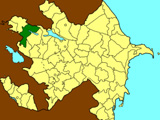Today.Az » Society » Tovuz – Land of mines
04 April 2008 [11:10] - Today.Az
 After a series of trips along some roads of Azerbaijan, a traveller becomes accustomed to chunks of raw asphalt falling into the growing potholes after the passage of any vehicle; the road from Baku on the Caspian Sea to the town of Tovuz in the west of Azerbaijan is no exception.
After a series of trips along some roads of Azerbaijan, a traveller becomes accustomed to chunks of raw asphalt falling into the growing potholes after the passage of any vehicle; the road from Baku on the Caspian Sea to the town of Tovuz in the west of Azerbaijan is no exception.
The road rises and falls through the foothills of the Caucasus Mountains whose snowy peaks can be detected through the haze and sometimes through the passages of the towering white poplar trees. This makes it easier to glimpse bits of beauty in the smudged surroundings and a landscape of unfinished houses and abandoned factories.
It takes about six hours to kill the four hundred kilometres from the capital of Azerbaijan to this remote region, adjacent to the border with Armenia. Frequent ceasefire violations are frightening every-day reminders of the still-unresolved conflict over Nagorno-Karabakh. This makes the lives of about 150 thousand inhabitants difficult to plan.
Driving into the town of Tovuz, centre of the region, one is greeted by flocks of sheep that can be seen by the side of main roads on the outskirts of the town, cattle crossing suburban streets. A snapshot of the town shows a mixture of ancient monuments, old Soviet buildings, huge new villas and small rundown houses. The living conditions have been gravely affected by the collapse of the infrastructure, unreliable supplies of gas and electricity, an inadequate sanitation system, and declining health and education services. Wherever one looks, facades are peeling through age and neglect. Posters, stuck up then torn down, reveal a space upon which everybody has given up; shops radiating misery.
The tempo of life has slowed to a snail's pace. People are wandering aimlessly down shabby streets. Local men in broad flat caps cluster in shady corners and barber shops playing dominoes and chatting. Heat is provided as it was in the past, by stoves burning timber brought down from the wooded slopes of the Caucasus.
Nevertheless, these people of Tovuz are very amicable and open and they certainly abide by an ancient rule – a guest is God’s gift to the host. Although productivity is low and food prices have risen dramatically, they still offer whatever they have.
Although the ‘good old times’ has become a thing of the past, people of Tovuz still hope that the sun in the Caucasus may not be slowly setting on them.
Among those most desperate and in greatest need are land mine survivors. Thousands of land mines are scattered throughout bordering areas such as Tovuz and people live in constant fear of these silent killers, remnants of recent war. These devices restrict access to the land and wreak havoc on the livelihoods of the residents; they exact a huge toll on eyes, limbs and lives.
“I was looking for my sheep and suddenly, when I started across the field, the earth seemed to move beneath my feet. I remember a fire that flashed in my face and shower of soil and than nothing; than I woke up as an invalid,” said Elbrus Huseynov from Shamkir’s , Zeyem Chirdakan Vilage.
“There are around 400 mine victims in the region; 60 of them are young survivors,” said Mr. Islam Bakhshaliyev, the director of the “Dirchelish” NGO that deals with the social and psychological rehabilitation of the youth.
Some of them are disabled by physical, intellectual or mental illness and are unable to succinctly define and communicate their problems or express their needs in a rational manner. Some require elementary care and/or special education and proper rehabilitation; some could work, but the smaller the town, the fewer the possibilities, especially for people with disabilities.
“When you meet mine survivors, it is an understandably edgy conversation; they are sad and angry,” said the United Nations Department of Public Information (UN DPI) Representative Ms. Envera Selimovic, after meeting a group of mine survivors of Tovuz region on 27 February 2008. During the two-hour live broadcast on local Simurg television, aimed at raising awareness about land mine survivors, their needs and potential contribution to the community, representatives of the local authorities, the Azerbaijani Parliament, Ombudsman’s office, various ministries and health care providers, promised assistance.
“Obviously those people, who overnight lost almost everything but their bravery and will to stay alive, need every possible support to integrate back into the community on an equal level with others.” said UN DPI Representative.
Dire straits call for dire measures. It is still to be seen. Tovuz is six hours drive from Baku. The farther from the capital you go, the sadder it becomes.
|
|